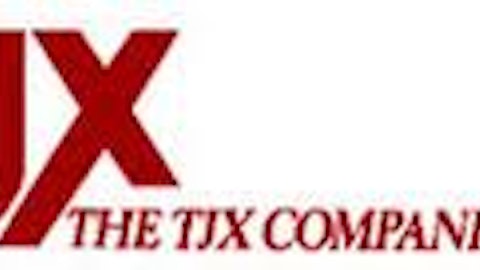Last week, Amazon.com, Inc. (NASDAQ:AMZN) announced a 22% increase in quarterly revenue, year over year. The company brought in $15.7 billion in the quarter, but its costs and thin margins meant that it recorded a loss overall. Yesterday, the company decided to spend more money: Amazon.com, Inc. (NASDAQ:AMZN) announced a plan to hire 5,000 new full-time employees for its fulfillment operation. That 5,000 is in addition to 2,000 positions that the company is attempting to fill in its other divisions.

So Amazon.com, Inc. (NASDAQ:AMZN) spent “too much” last quarter, and the solution was to spend more. OK…
The problem with “too much”
Of course, what Amazon.com, Inc. (NASDAQ:AMZN) has done for years is spend too much money. Investors were elated at the end of its fourth quarter, when U.S. operating margin finally began to expand. The stock jumped almost 5% on the day, though it then flatlined through May. The newest earnings statement showed a year-over-year decline in operating margin, with the U.S. business coming in at just 4.3%.
Amazon.com, Inc. (NASDAQ:AMZN) keeps spending more to make more, but investors keep looking for the business to grow profit. The difference is the way CEO Jeff Bezos views the world. While investors traditionally look for companies to hold on to as much as possible from each dollar, Bezos has gone on record as saying that that’s not his strategy. Instead, he wants to maximize “absolute dollar free cash flow per share.”
Last year, the company hit close to $400 million in free cash flow, which broke down to around $0.87 per share. That’s a far fall from the company’s highs, which it hit in the early Internet days, but it’s still a meaningful amount of cash. However, it does pose a problem for investors. Should they stick around and hope that investments will start to pay off, or is there simply no end to the amount of money that Bezos can spend?
The problem with too much
An investment in Amazon.com, Inc. (NASDAQ:AMZN) has to be based on the premise that the company is going to be able to cut back at some point, and that the earnings per share are simply going to increase almost exponentially. There is no other reason that a company with such slim margins would command a high P/E ratio — when it’s making money, that is.
So when does it all stop? Now, Amazon is building and staffing new fulfillment centers to get products out sooner, but if I want it now, I can just go to Best Buy Co., Inc. (NYSE:BBY) and it’ll match Amazon’s price.
From my point of view, it looks like Amazon is now spending money to keep the market share it already had, but without any new benefit.
If Amazon has become an oil tanker lost at sea, Best Buy Co., Inc. (NYSE:BBY) is increasingly looking like a sinking ship with a bunch of lifeboats. There’s no reason to jump on for the buffet — it’s submerged and was just crab cakes, anyway — but the ride in the little boat could be really fun. Best Buy Co., Inc. (NYSE:BBY)’s price matching and focus on mobile have given it a breath of fresh air, and the business actually saw some segments posting high year-over-year comparable sales last quarter. Mobile alone was up 7.4%, although entertainment dropped 17.2%. But the business at least has some options. Amazon seems stuck in the low-margin, low-income doldrums.
As I’ve said before, I think an investment in Amazon says as much about your faith in Bezos as it does about your belief in the business model. I like Bezos a lot, but I’m starting to lose my nerve — I just suggested that maybe Best Buy Co., Inc. (NYSE:BBY) wasn’t a horrible investment, for crying out loud. The big profit keeps being just over the horizon, and as much as I like the idea of hiring lots more people, I’m getting tired of chasing the edge of the world for the sake of market share.
The article Jeff Bezos Found a Way to Spend Even More Money — Surprise! originally appeared on Fool.com is written by Andrew Marder.
Fool contributor Andrew Marder has no position in any stocks mentioned. The Motley Fool recommends and owns shares of Amazon.com.
Copyright © 1995 – 2013 The Motley Fool, LLC. All rights reserved. The Motley Fool has a disclosure policy.





